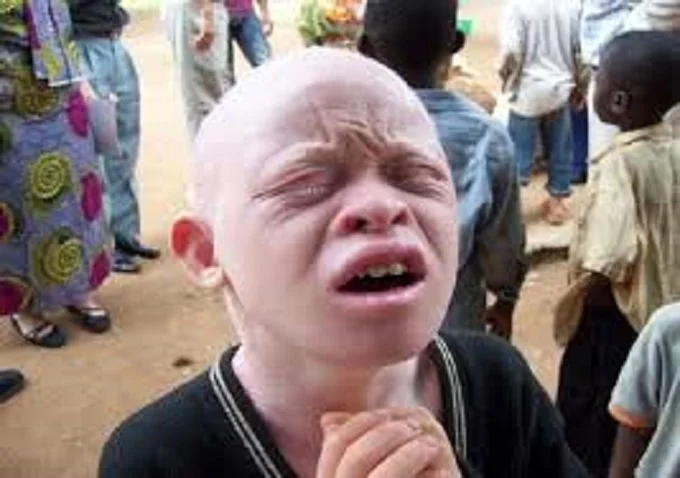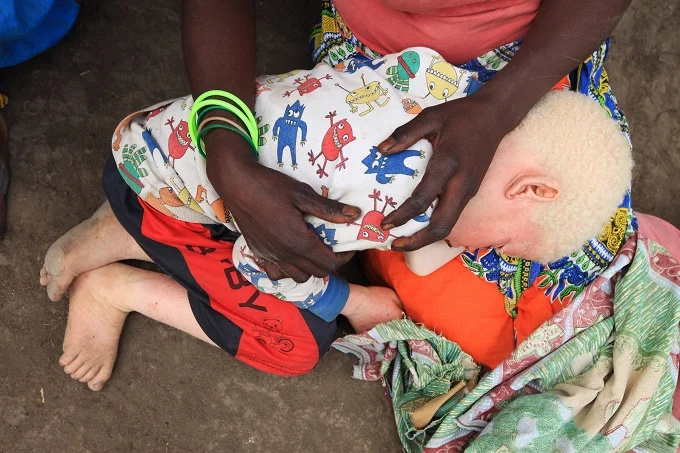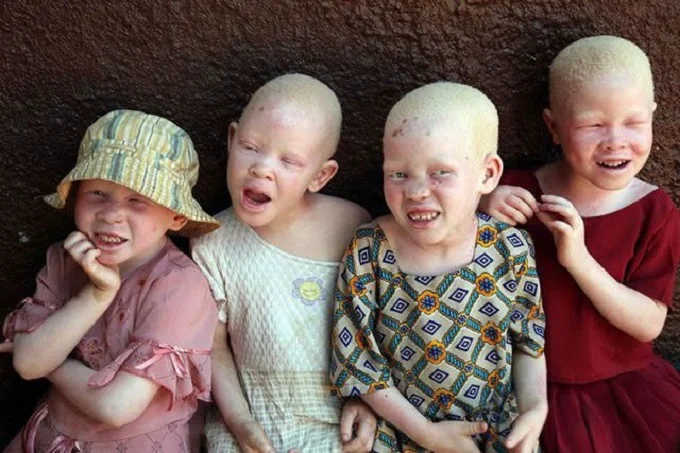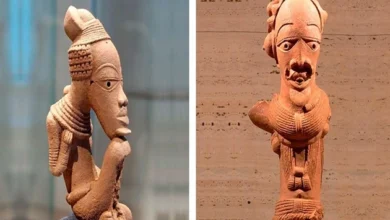Why are Albinos killed in Africa?

Two centuries ago, it was believed that albinos were born from the mating of an African woman with the white “master”. For this, people with albinism are being killed. They were demonized; today, they are fought with voodoo rituals and superstitions.
Scientifically speaking, albinism can be used to define multiple “genetic abnormalities, characterized by a congenital reduction or absence of melanin in the skin, hair, and eyes (oculocutaneous albinism) or almost exclusively in the eyes (ocular albinism)”. Revered by many ancient societies, they are still subject to violence, rape, and social discrimination in Africa.
In 2017, four Tanzanian albino children were expatriated to the United States to receive needed medical care after being brutally attacked in their homeland.
In Malawi, where for reasons yet to be ascertained, more people with albinism are born than anywhere else in the world, persecution of albinos is the order of the day. According to records, since 2014, there have been at least 117 documented attacks on people with albinism, with a final tally of at least twenty deaths.
In the last ten years, there have been at least 600 attacks in all 27 countries of Sub-Saharan Africa. Behind these events, there are material and spiritual instigators: the first are those who attack villages with machetes in hand, kidnap albinos or even kill them, and many others steal their bones from cemeteries. Instead, the spiritual instigators are poverty and superstition, which feed ancient beliefs and give rise to heinous crimes.
David Fletcher, a 17-year-old boy, a resident of the village of Nambilikira, was just another Malawi until he disappeared into thin air in April 2016. His parents told the police that the boy had to go to the school in the region to attend a soccer match organized there. After weeks of searching, his lifeless body was found in Mozambique.
On March 9, 2016, also on the border with Mozambique, another boy disappeared into thin air: Macdonald Masambuka was 22 years old and also suffered from albinism. APAM, the association that brings together the families of albinos in Malawi, in concert with the Minister of Information and Communication Technology Nicholas Dausi, has called for a tightening of the penalties to which people involved in such news events are condemned. Dausi has even hoped that only the death penalty will stop this wave of violence that affects innocent and weak people, too often already excluded from society or even from their own families.
The practice of digging up the corpses of albinos is so frequent now that families often prefer to bury them at home and not in cemeteries in Tanzania.
Josephat Torner, a charismatic leader of albinos in Tanzania, has in fact clearly denounced that “It is based on the growth of these acts that we are planning an intervention that could include a legal action that will give a verdict for the right to the respectful burial of our colleagues when they die so that they can rest in peace”.
Albino woman cures AIDS
One of the hardest superstitions to fight is that which links AIDS with albinism: having sexual intercourse with an albino woman, according to ancient beliefs, would allow the male individual affected by the disease to be cured.
According to Amnesty International, in recent years, episodes of violence against women with albinism have increased. Mercy Zainabu Banda was 31 years old and had 3 children: she disappeared in Lilongwe, Malawi, on February 23, 2017, to be found after two days with her hair, breast, and right arm removed.
With its good intentions of equality, justice, and civil progress, the constitution of Malawi can do nothing against practices and beliefs as old as the earth itself. Basic education may be the only way to save more albino Africans from these terrible killings.

The Tanzanian newspaper The Citizen reports, in an article of March 2018, that since 2007, 76 Tanzanian albinos have been killed.
The KCBRP assistance program, Karagwe Community Based Rehabilitation Program, is active in the country: born in 2003 thanks to the work of the Anglican Church of Tanzania, the project is aimed at family members of people with disabilities, unable to conduct a cycle of studies or private unfairly of their own rights. With albino children, their main objective is to gradually reintegrate them into the civil society of origin without being considered as second-class citizens.
To achieve this goal, the group periodically organizes information meetings with local authorities, religious leaders, or ordinary people to explain albinism and what causes it and thus eradicate wrong beliefs and promote social integration.
Tanzania, however, remains a dangerous country for albinos, and the story of Robinson Mkwama reminds us that much remains to be done.
The story dates back to 2010 and sees as the protagonist a 20-year-old albino boy of Kenyan origin. Abandoned by his family due to the color of his skin, he grew up in an orphanage in Nairobi, where he had contact with only two people for twenty years: his adoptive mother and friend Nathan Mutei.
One day, he proposes to his friend Mkwama to follow him to Tanzania because he would have found a good job for both of them as bus drivers: arrived in the new country, however, the police arrest Mutei, who in the meantime had tried to sell his friend to local sorcerers for an amount close to 250,000 dollars.
Nonetheless, Tanzania is also a land of social redemption for the nearly 100,000 albinos who were born here and who want to continue living here. Indeed, given the size and regional importance of the country, even albinos from neighboring countries are looking hopefully at Tanzania.
Association of Albinos
From Dar es Salaam, the capital of the country whose name means “house of peace”, cheering news arrives about the battle for equal rights that many associations are carrying out: thanks to the patronage of Miss Tanzania 2012. In February 2018, the first fashion show of albino models was organized that gave life to the festival “My skin my proud”.
Albino United was also born in Dar es Salaam, the first team in the world to be composed almost exclusively of albino players. The sporting results are not the best, but every single individual knows perfectly well that every time he takes the field, he is not playing a football match, he is teaching a life lesson to those like him who live in indifference and need.

United Nations
The United Nations has launched several initiatives on the problem of albinism in Africa: in Dar es Salaam the first forum on albinism was promoted, with the participation of 28 African countries: June 13 was solemnly chosen as the date for the “International Day of Albinism”, while resolution A/HRC/RES/28/6 recommended the states of the assembly to urgently take all possible precautions to prevent attacks on people with albinism, to promptly launch investigations and controls against alleged offenders, to initiate policies of social inclusion and removal of all possible discrimination linked to skin color, and finally to encourage states to share some “good practices regarding the protection and promotion of the human rights of people with albinism”.
In June 2015, Miss Ikponwosa Ero, an albino of Nigerian origin, was chosen to be the first “UN Independent Expert” on the discrimination suffered in Africa by other people with the same disease as her. Miss Ero has a great deal of experience gained from years and years of international struggles to protect the rights of people with albinism: hundreds of thousands of Africans with albinism look to this with renewed hope for a better future.




